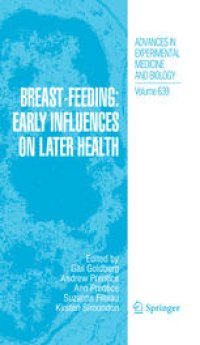
Ebook: Breast-Feeding: Early Influences on Later Health
- Tags: Human Physiology, Immunology, Maternal and Child Health, Nutrition, Epidemiology
- Series: Advances in Experimental Medicine and Biology 639
- Year: 2009
- Publisher: Springer Netherlands
- Edition: 1
- Language: English
- pdf
Breast-Feeding: Early Influences on Later Health is a new book which draws together areas of research in early lifel programming of adult health, with a unique focus on the post-natal period in terms of early life programming particularly the extent to which differences in infant feeding practices can lay an indelible imprint on metabolism and behaviour, and hence affect later function and risk of disease. This is an area where there is much less information currently available than there is for fetal programming, and the book raises many new questions and highlights numerous areas where further research is needed. The book chapters are arranged in three core sections: Chapters 1-4 lay down some of the basic biology of early life development; Chapters 5-9 examine how breast-milk and breast-feeding might ‘programme’ these processes by acting as modulators of development; Chapters 10-17 examine the epidemiological evidence that such effects do indeed exist. In addition the book includes unique chapters on the Evolution of human lactation and complementary feeding, The Macy-György Prize Lecture ‘My Milky Way’, updates on HIV and Breast-Feeding and on Early breastfeeding cessation and infant mortality in low-income countries, and measuring trace immune factors in human milk, all important topics that have such a critical impact on child health and survival in many countries.
Breast-Feeding: Early Influences on Later Health is a new book which draws together areas of research in early lifel programming of adult health, with a unique focus on the post-natal period in terms of early life programming particularly the extent to which differences in infant feeding practices can lay an indelible imprint on metabolism and behaviour, and hence affect later function and risk of disease. This is an area where there is much less information currently available than there is for fetal programming, and the book raises many new questions and highlights numerous areas where further research is needed. The book chapters are arranged in three core sections: Chapters 1-4 lay down some of the basic biology of early life development; Chapters 5-9 examine how breast-milk and breast-feeding might ‘programme’ these processes by acting as modulators of development; Chapters 10-17 examine the epidemiological evidence that such effects do indeed exist. In addition the book includes unique chapters on the Evolution of human lactation and complementary feeding, The Macy-György Prize Lecture ‘My Milky Way’, updates on HIV and Breast-Feeding and on Early breastfeeding cessation and infant mortality in low-income countries, and measuring trace immune factors in human milk, all important topics that have such a critical impact on child health and survival in many countries.